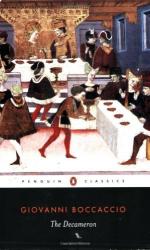|
This section contains 5,391 words (approx. 18 pages at 300 words per page) |

|
SOURCE: Auerbach, Erich. “Frate Alberto.” In Critical Perspectives on the “Decameron,” translated by Willard Trask and Robert S. Dombroski, edited by Robert S. Dombroski, pp. 69-81. London: Hodder and Stoughton, 1976.
In the following essay, Auerbach offers a close textual analysis of how Boccaccio's style and syntax influence the tone and momentum of his narrative.
In a famous novella of the Decameron (IV, 2), Boccaccio tells of a man from Imola whose vice and dishonesty had made him a social outcast in his native town, so that he preferred to leave it. He went to Venice, there became a Franciscan monk and even a priest, called himself Frate Alberto, and managed to attract so much attention by striking penances and pious acts and sermons that he was generally regarded as a godly and trustworthy man. Then one day he tells one of his penitents—a particularly stupid and conceited creature...
|
This section contains 5,391 words (approx. 18 pages at 300 words per page) |

|


